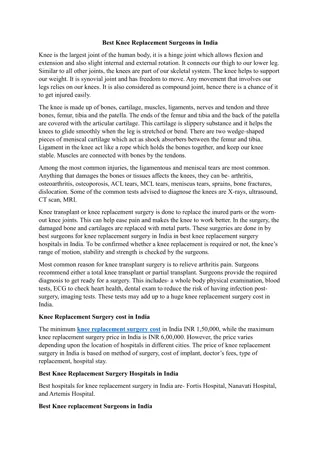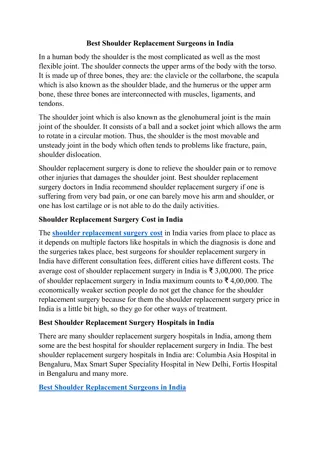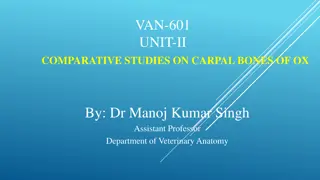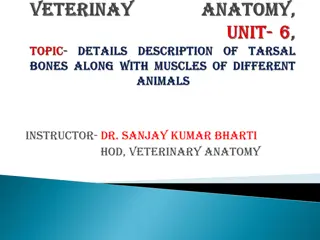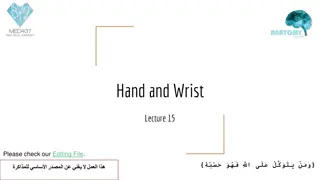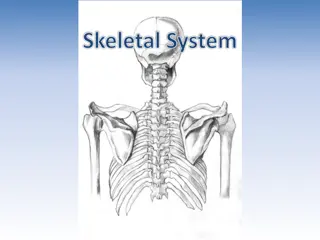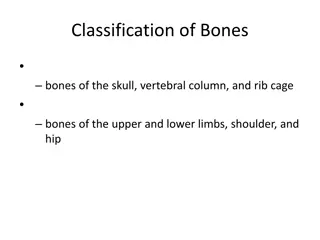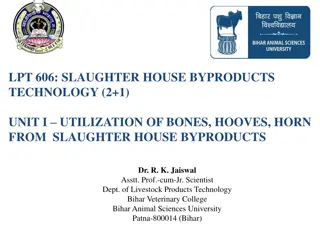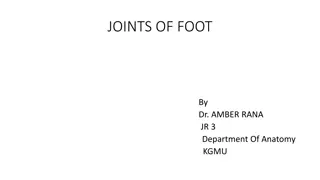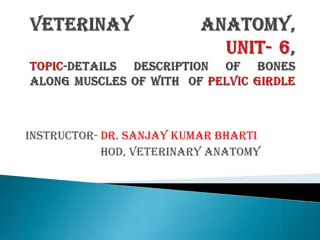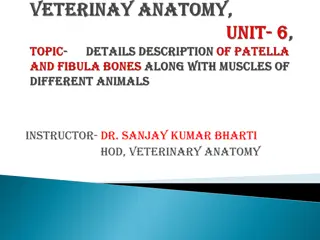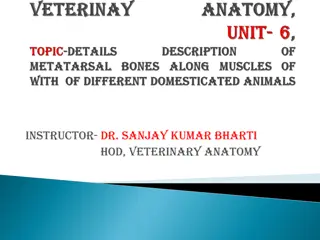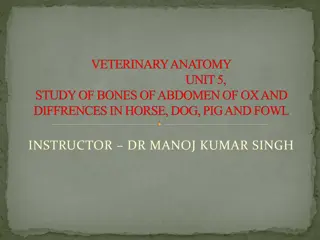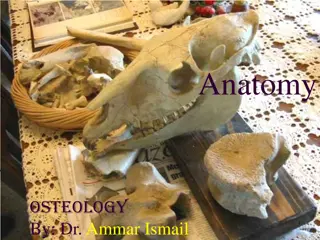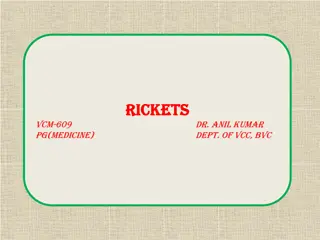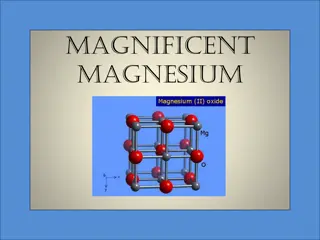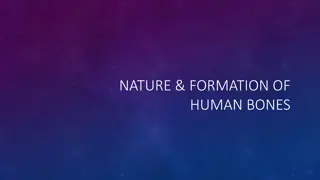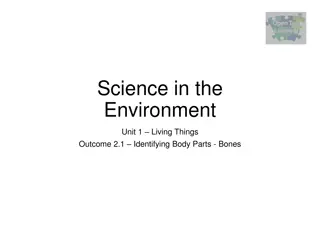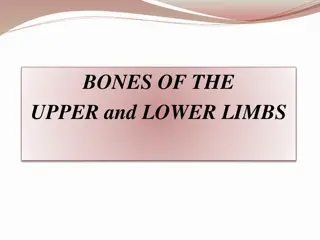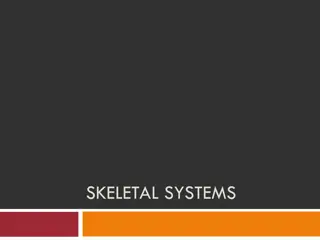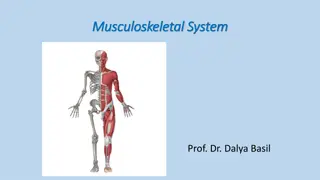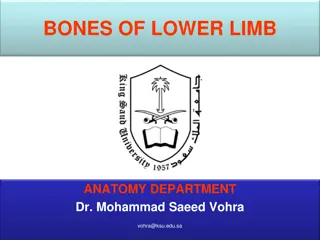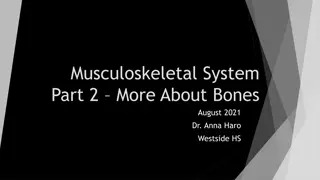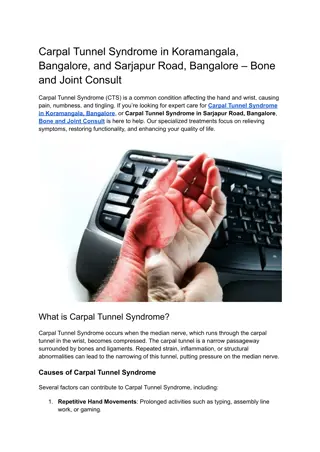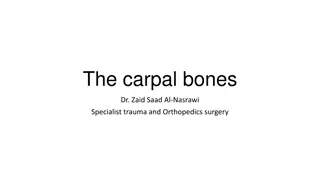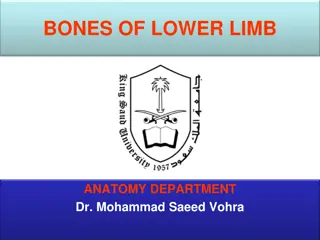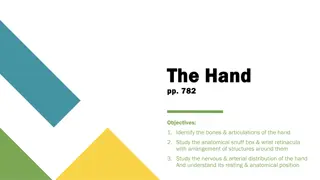Understanding Bone Anatomy and Composition
Explore the intricate details of bone structure and function, from the classification of bones by shape to the constituents of bone tissue. Learn about the essential role bones play in providing structural support, protection, and blood cell production. Delve into the anatomy of long and flat bones,
7 views • 31 slides
Ethical Dilemma of the Illegal Bone Trade in India
PowerPoint slides shed light on the unethical history and persistent issue of the illegal bone trade in India, questioning the ethical implications of using bones from questionable sources in education. The trade's colonial roots, lack of consent, and profiting from the vulnerable raise concerns abo
1 views • 4 slides
Best Knee Replacement Surgeons in India
Knee is the largest joint of the human body, it is a hinge joint which allows flexion and extension and also slight internal and external rotation. It connects our thigh to our lower leg. Similar to all other joints, the knees are part of our skeletal system. The knee helps to support our weight. It
0 views • 2 slides
Best Shoulder Replacement Surgeons In India
In a human body the shoulder is the most complicated as well as the most flexible joint. The shoulder connects the upper arms of the body with the torso. It is made up of three bones, they are: the clavicle or the collarbone, the scapula which is also known as the shoulder blade, and the humerus or
0 views • 2 slides
Comparative Studies on Carpal Bones of Ox
The carpus of ox consists of six bones arranged in two rows - four in the proximal and two in the distal rows. These bones include the radial carpal, intermediate carpal, ulnar carpal, accessory carpal, and fused second and third carpal bones. Each bone has specific features and articulations contri
1 views • 14 slides
Understanding Tarsal Bone Anatomy in Veterinary Science
Tarsal bones in veterinary anatomy play a crucial role in the structure of an animal's hind limbs. Comprising five short bones arranged in distinct rows, including the tibial, fibular, and central tarsals, the tarsus supports movement and stability. The largest tarsal, known as the calcaneal tubercl
1 views • 24 slides
Anatomy of Hand and Wrist: Structures and Functions Overview
This lecture covers the anatomy of the hand and wrist, focusing on the deep fascia, flexor and extensor retinacula, and the insertion of tendons. It explores the structures passing superficial and deep to the flexor retinaculum and the small muscles of the hand. Important details about the carpal tu
1 views • 22 slides
Exploring the Human Skeletal System
The skeletal system is crucial for protecting organs, providing structure for movement, storing minerals, and producing blood cells. It consists of the axial and appendicular skeleton, with bones classified into long, short, flat, and irregular shapes. Long bones, such as the femur, play a key role
2 views • 28 slides
Understanding Bones: Classification, Functions, and Markings
Explore the classification of bones based on shape, learn about the functions of bones in supporting the body and protecting vital organs, and understand the different bone markings that serve as attachment sites and joint formations.
1 views • 34 slides
Overview of Hands and Upper Extremity Conditions
This informative content covers various hand and upper extremity conditions including nerve innervation, deformities, splints, and syndromes such as carpal tunnel syndrome and cubital tunnel syndrome. It discusses key nerves like the ulnar, median, and radial, their functions, associated deformities
1 views • 40 slides
Utilization of Bones, Hooves, and Horn from Slaughterhouse Byproducts
Bones, hooves, and horns from slaughterhouse byproducts hold significant value and can be utilized for various purposes. Bones contain organic and inorganic matter, with applications in manufacturing, poultry feeds, and pottery. Hooves and horns contribute to gelatine and glue production, derived fr
0 views • 42 slides
Overview of Foot Joints and Bones: Anatomy and Movements
Foot anatomy involves 26 bones forming various joints like interphalangeal, metatarso-phalangeal, and tarso-metatarsal joints. Ligaments and movements at these joints play crucial roles in foot function. Understanding the structure and function of these joints is essential for medical professionals
2 views • 19 slides
Understanding Pelvic Limb Anatomy: Bones and Muscles Overview
Bones and muscles of the pelvic limb, including the pelvis, thigh, leg, and foot, are detailed in this informative content. It covers the general designations of pelvic bones, descriptions of bones along with muscle attachments in various animals, and specifics about the hip bone structure and forma
1 views • 15 slides
Anatomy of the Ox Radius: Structure and Function
The radius of an ox is the larger and shorter bone of the forearm, situated between the elbow and carpal joints. It consists of a shaft with distinct surfaces and borders, facilitating muscle attachments and joint movements in the forelimb. The proximal extremity articulates with the humerus, while
0 views • 11 slides
Comparative Anatomy of Sesamoid Bones in Various Animals
This content provides a detailed comparison of sesamoid bones in different animals such as ox, sheep, goat, horse, pig, dog, and fowl. It highlights the variations in size, shape, and structure, showcasing how these bones differ in anatomy across species.
2 views • 12 slides
Veterinary Anatomy of Ox Metatarsus Bones
The metatarsus bones of an ox consist of fusion of large and small metatarsal bones. The large metatarsal bone has distinct features at its proximal and distal extremities, while the small metatarsal is disc-shaped and located at the postero-medial aspect. The ox also has three metatarsal bones, one
0 views • 18 slides
Comparative Study of Abdominal Bones in Various Animals
Study of the abdominal bones in the ox highlights characteristics like elongated transverse and curved articular processes, whereas differences in horse bones include shorter bodies and varying curvature of transverse processes. Understanding these anatomical variances provides insights into the uni
0 views • 16 slides
Comparative Studies on Metacarpals of Ox
This study examines the metacarpal bones of ox, focusing on the large metacarpal and the lateral small metacarpal. The large metacarpal consists of a shaft with distinct surfaces and borders, while the proximal and distal extremities have specific features for articulation and ligament attachment. T
4 views • 13 slides
Understanding Osteology: An Overview of Bone Structures and Skeleton Composition
Osteology is the study of anatomical structures such as bones, cartilages, and the skeleton that support and protect the body. It includes the classification of bones based on shape and function, details on bones of the thoracic and pelvic limbs, and the divisions of the skeleton into axial, appendi
0 views • 15 slides
Understanding Rickets: Causes, Symptoms, and Pathophysiology
Rickets is a metabolic bone disorder primarily caused by deficiencies in vitamin D, calcium, or phosphorus. This leads to softening and weakening of bones, affecting bone growth and remodeling. Genetic, nutritional, and hormonal abnormalities contribute to this condition, impacting young growing ani
0 views • 16 slides
The Importance of Magnesium for Good Health
Magnesium is a vital mineral essential for good health, with benefits including muscle and nerve function support, maintaining heart rhythm, and keeping bones strong. It is involved in over 300 bodily reactions and is abundant in the body, primarily in bones. Sources of magnesium include nuts, beans
0 views • 9 slides
Understanding the Anatomy of the Wrist Complex
The wrist complex consists of the radiocarpal joint and midcarpal joint, formed by various bones and ligaments. The radiocarpal joint involves the radius, radioulnar disc, scaphoid, lunate, and triquetral bones. In a neutral position, the ulna does not participate in this joint. The midcarpal joint
0 views • 16 slides
Understanding the Nature and Composition of Human Bones
The skeletal system, composed of bones and cartilage, plays crucial roles in support, protection, mineral homeostasis, blood-cell formation, and triglyceride storage. Bones consist of organic collagen matrix, inorganic mineral salts, and water, with two main types of bone tissue - cortical and cance
0 views • 24 slides
Forensic Anthropology and Missing Persons Investigation
The investigation into missing persons using forensic anthropology techniques, focusing on the analysis of bones like the humerus for height approximation and identification. Families await closure as the FBI looks into washed ashore bones, potentially bringing answers and resolving insurance claims
0 views • 13 slides
Understanding the Human Skeletal System
Explore the functions of the skeletal system, learn about the various types and main bones, understand the importance of bone health, and discover the divisions of the skeleton - axial and appendicular. Dive into the intricacies of bone structure, functions, and how bones support, protect, and enabl
0 views • 12 slides
Comparing C and pMC Values in Dinosaur Bones: A Study Across Multiple Regions
Results from a study comparing carbon (C) and percent of modern 14C (pMC) values in various bone fractions of dinosaurs across different regions are presented. The study utilized Accelerated Mass Spectrometer (AMS) technology, with samples pre-treated to eliminate contaminants. The findings reveal a
0 views • 47 slides
Exploring Human Bones: An Introduction to the Skeletal System
In this unit, you will delve into the fascinating world of human bones. From the skull to the legs, discover the vital roles each bone plays in our body. Learn about the human skeleton, identify important bones, and understand the functions of key body parts. Engage with interactive activities and b
0 views • 10 slides
Understanding the Bones of Upper and Lower Limbs
Explore the classification and main features of bones in the upper and lower limbs, including the arm, forearm, hand, thigh, leg, foot, and pectoral girdle. Learn about the clavicle, scapula, and humerus in detail, identifying key structures and functions to enhance your knowledge of human anatomy.
0 views • 24 slides
Overview of Appendicular Skeleton and Bones by Dr. Mahdi H. Hammadi, PhD, Sc. Clinical Physiology
Dr. Mahdi H. Hammadi, PhD, Sc. in Clinical Physiology, provides an insightful look into the bones of the appendicular skeleton, including the shoulder girdle, upper limbs, wrist bones, and hand bones. The text covers the composition and functions of these skeletal elements in a comprehensive manner,
0 views • 21 slides
Understanding Bone and Cartilage: An Overview
Bones are essential rigid connective tissues in the human body made up of cells and extracellular matrix. The lecture delves into the cellular components of bone tissue, highlighting osteoprogenitor cells, osteoblasts, osteocytes, and osteoclasts, each with specific functions in bone maintenance and
0 views • 11 slides
Exploring the Human Skeletal System
The skeletal system plays crucial roles in supporting the body, protecting internal organs, facilitating movement with muscles, and producing blood cells. It consists of various bone structures like periosteum, compact bone, spongy bone, and bone marrow. The cranium houses important bones such as th
0 views • 53 slides
Comparative Anatomy of Horse and Human Bones at Whispering Oak Stables
Explore the detailed comparison of horse and human bones, highlighting the similarities and differences in their structure and function. From forelimbs to hind legs, discover homologous structures and learn how these anatomical features serve unique purposes in each species.
0 views • 11 slides
Understanding the Anatomy of the Skeletal System
Explore the two major sections of the skeletal system: the Axial Skeleton, which provides protection to vital organs, and the Appendicular Skeleton, enabling movement. Discover variations in bone structure across species, from horses to dogs, and delve into the bones of the Axial Skeleton, including
0 views • 29 slides
Understanding the Musculoskeletal System in the Human Body
The musculoskeletal system, comprising the muscular and skeletal systems, supports body movement, stability, and shape. It includes muscles, bones, tendons, ligaments, and joints. This system serves functions like providing support, protection to vital organs, mediating movement, and producing blood
0 views • 36 slides
Anatomy of Lower Limb Bones: Thigh (Femur and Patella) Overview
Explore the detailed anatomy of the bones in the lower limb, specifically focusing on the thigh bones - the femur and patella. Learn about the structure, function, and key features of these bones, including their articulations, surfaces, and attachments. Enhance your understanding of the classificat
0 views • 22 slides
Exploring Human Skeleton Anatomy: Bones, Structure, and Functions
Delve into the intricate details of the human skeleton, including the organization of bones in the axial and appendicular skeletons. Learn about the different bones comprising the skeletal system, their functions, and the significance of memorizing 144 bones. Discover learning objectives related to
0 views • 8 slides
Carpal Tunnel Syndrome in Koramangala, Bangalore, and Sarjapur Road, Bangalore – Bone and Joint Consult
If you\u2019re struggling with Carpal Tunnel Syndrome in Koramangala, Bangalore, or Carpal Tunnel Syndrome in Sarjapur Road, Bangalore, Bone and Joint Consult is your trusted partner for effective diagnosis and treatment.\nCall us now or book an appo
0 views • 3 slides
Overview of Carpal Bones and Carpal Tunnel Anatomy
Carpal bones are arranged in two rows with distinct features such as the flexor retinaculum and extensor retinaculum that form the carpal tunnel. Radiological features and nutrient arteries of the scaphoid bone are crucial in understanding carpal anatomy. Ossification of the carpal bones occurs in a
0 views • 13 slides
Lower Limb Bones Anatomy Overview
Explore the bones of the lower limb, including the femur and patella of the thigh. Learn about the structure and features of these bones such as the head, neck, trochanters, and shaft of the femur. Enhance your knowledge on the classification of bones in the thigh, leg, and foot regions, distinguish
0 views • 22 slides
Understanding the Anatomy of the Hand and Wrist
Explore the bones, articulations, and structures of the hand and wrist, including carpal bones, flexor and extensor retinaculum, and carpal tunnel. Learn about the anatomical snuff box, wrist retinacula, nervous and arterial distribution, and the resting and anatomical position of the hand. Detailed
0 views • 20 slides


